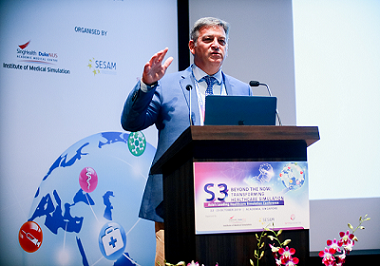Simulation for Safer Systems in India
Main Conference ProgrammeDate: 07 Nov 2025, Fri | Time: 1300 - 1430 | Track Type: Workshops
Format: Face-to-face | Venue: Level 1, L1-S4, Academia
Speakers: Lt Gen Prof Ashok Jindal, Prof Debendra Kumar Tripathy and Asst Prof Naman Agrawal
Speaker: Lt Gen Prof Ashok Jindal
Title: Scaling Simulation for Medical Education and Public Health Preparedness in India: Opportunities, Innovations, and the Road Ahead
Simulation-based learning has become an essential element of modern medical education, offering risk-free, experiential environments for clinical training, team coordination, and systems preparedness. In India, the role of simulation is expanding beyond academic institutions to include community outreach, health systems testing, and disaster readiness.
Learning Outcomes:
- Examine the current integration of simulation into India’s medical education, community training, and public health preparedness, highlighting both high-fidelity and scalable low-fidelity approaches.
- Explore emerging technologies—including digital twins, AI-driven analytics, serious games, and AR/VR—demonstrating their potential to enhance system testing, predictive modeling, and emergency readiness in the Indian context.
- Identify challenges and gaps in India’s simulation ecosystem, such as policy integration, faculty development, funding limitations, and equitable access, and compare these with global best practices and WHO guidelines.
Speaker: Prof Debendra Kumar Tripathy
Title: Human Factors Engineering: Designing Safer ED Systems Through Simulation
Emergency Departments (EDs) are complex sociotechnical systems where people, technology, physical space, and processes interact under time pressure and uncertainty. Human Factors Engineering (HFE) applies evidence-based design principles—about cognition, ergonomics, workflows, and environment—to reduce error, increase reliability, and improve both patient and staff safety. Simulation is uniquely positioned to reveal latent safety threats, test redesigns, and train teams within the real work environment without patient risk. This talk aims to demonstrate how HFE methods combined with targeted simulation (in-situ, tabletop, hybrid and digital) can systematically identify system weaknesses in the ED, validate low- and high-fidelity design changes, and produce measurable improvements in throughput, safety, and staff performance. The goal is to move beyond individual training to designing safer systems—iteratively, collaboratively, and sustainably—so EDs function reliably under everyday pressure and during surges.
By the end of the session, participants will be able to:
- Define core human factors concepts (workload, situational awareness, affordances, constraints, error modes) and explain why they matter in the ED.
- Describe how different simulation modalities (in-situ, tabletop, hybrid, digital twin) are used to surface latent safety threats and test system redesigns.
- Apply a simple, replicable HFE + simulation workflow to a common ED problem
- List practical, human-centered designs that emerged from simulation-based system testing.
- Select appropriate outcome metrics to evaluate the impact of simulation-driven system changes.
Speaker: Asst Prof Naman Agrawal
Title: Game-based training in AIIMS Triage Education: Engaging Learners Through Play
Triage is the cornerstone of timely and effective emergency care. The AIIMS Triage Protocol (ATP) is a standardized, evidence-based system designed to optimize patient prioritization in emergency departments across India. However, traditional teaching methods for ATP often fail to sustain learner engagement, especially among Generation Z and millennial trainees. Game-based training introduces interactivity, competition, and experiential learning, thereby enhancing motivation, retention, and the practical application of skills. Globally, gamification has shown promise in medical education; however, structured models specific to the AIIMS Triage Protocol (ATP) are currently lacking.
The aim of the talk is to present game-based learning as an innovative pedagogy for triage education and to showcase its integration with the AIIMS Triage Protocol. To discuss current practices, felt needs, and future directions in gamified triage training for medical and nursing students.
By the end of the session, participants will be able to:
- Understand the limitations of conventional triage teaching methods and the rationale for adopting game-based strategies.
- Describe the principles and design of a gamified board-game model for AIIMS Triage Protocol training.
- Identify opportunities and challenges for scaling gamification in triage education within India and globally.
© 2025 SingHealth Group. All Rights Reserved.














